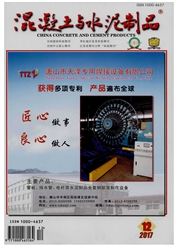

 中文摘要:
中文摘要:
通过聚乙烯醇纤维增强水泥基复合材料(polyvinyl alcohol fiber reinforced cementitious composite,PVAFRCC)和普通混凝土在干湿交替条件下的氯盐侵蚀试验,研究了干湿循环次数、纤维体积掺量、温度梯度对PVAFRCC氯离子侵蚀深度的影响,并从水泥基内部孔隙结构和微裂缝两个主要方面进行了机理分析。结果表明,随干湿循环次数的增加,PVA-FRCC与普通混凝土氯离子侵蚀深度均在增大,且PVA-FRCC氯离子侵蚀深度和侵蚀速度均比普通混凝土的低,随着纤维掺量从0~2%增加,PVA-FRCC氯离子侵蚀深度总体呈降低趋势;随着干循环温度以20℃、40℃、60℃的梯度升高,PVA-FRCC氯离子侵蚀深度增大,纤维掺量为2%的PVA-FRCC表现出较好的抗氯盐侵蚀能力。
 英文摘要:
英文摘要:
The corrosion resistance of polyvinyl alcohol fiber reinforced cementitious composite(PVA-FRCC) and concrete in chloride environments is investigated via dry-wet test. The influence of dry-wet cycles, content of fiber and temperature gradient on the depth of chloride corrosion of PVA-FRCC is analyzed,and cement-based internal pore structure and micro crack are analyzed on mechanism. The results show that the chloride ions corrosion depth of PVA-FRCC and concrete increase with the increase of cycle number under double environment of dry-wet cycle, and chloride ion corrosion depth and corrosion rate of PVA-FRCC are lower than that of normal concrete. With the fiber content increasing from 0~2%, PVA-FRCC chloride ion corrosion depth becomes decreasing trend. With the dry circulating temperature gradient of20℃, 40℃ to 60℃ elevating, chloride ion corrosion depth of PVA-FRCC increases, and PVA-FRCC with 2% PVA fiber shows better resistance to chloride corrosion.
 同期刊论文项目
同期刊论文项目
 同项目期刊论文
同项目期刊论文
 期刊信息
期刊信息
